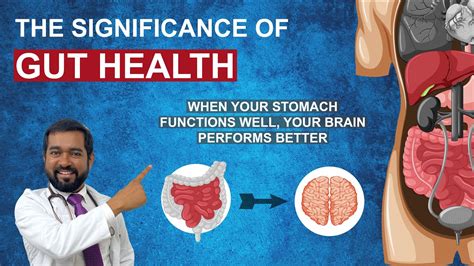Dr Israel Guide: Gut Health Expert

Dr. Israel is a renowned expert in the field of gut health, with a wealth of knowledge and experience in helping individuals achieve optimal digestive well-being. As a leading authority in his field, Dr. Israel has dedicated his career to understanding the complex relationships between the gut microbiome, nutrition, and overall health. With a strong foundation in scientific research and a passion for educating others, Dr. Israel has become a trusted guide for those seeking to improve their gut health and alleviate symptoms associated with digestive disorders.
Gut Health and Its Importance

The gut, also known as the gastrointestinal tract, plays a vital role in maintaining overall health and well-being. It is responsible for digesting and absorbing nutrients, eliminating waste, and housing a vast array of microorganisms that make up the gut microbiome. A healthy gut microbiome is essential for a strong immune system, proper digestion, and even mental health. However, an imbalance of the gut microbiome, also known as dysbiosis, can lead to a range of health issues, including digestive disorders, autoimmune diseases, and even mental health conditions. Dr. Israel emphasizes the importance of maintaining a healthy gut microbiome through a balanced diet, lifestyle modifications, and targeted supplements.
The Impact of Diet on Gut Health
Diet plays a significant role in shaping the gut microbiome. A diet rich in whole, unprocessed foods, such as fruits, vegetables, whole grains, and lean proteins, provides the necessary nutrients and fiber for a healthy gut microbiome. On the other hand, a diet high in processed and sugary foods can lead to an imbalance of the gut microbiome, resulting in dysbiosis. Dr. Israel recommends a diet that is rich in fermented foods, such as yogurt, kefir, and sauerkraut, which contain live cultures that can help support the growth of beneficial microorganisms in the gut.
| Food Type | Benefit to Gut Health |
|---|---|
| Fermented Foods | Supports the growth of beneficial microorganisms |
| Whole Grains | Provides fiber for a healthy gut microbiome |
| Leafy Greens | Rich in antioxidants and fiber |
| Omega-3 Rich Foods | Reduces inflammation and supports gut health |

Gut Health and Mental Health

There is a growing body of research that suggests a strong link between gut health and mental health. The gut and the brain are connected through the gut-brain axis, a bidirectional communication network that allows for the exchange of information between the two. An imbalance of the gut microbiome has been linked to a range of mental health conditions, including anxiety, depression, and bipolar disorder. Dr. Israel emphasizes the importance of addressing gut health in the treatment of mental health conditions, and recommends a holistic approach that includes dietary modifications, stress management, and targeted supplements.
The Role of Supplements in Supporting Gut Health
While diet and lifestyle modifications are essential for maintaining a healthy gut microbiome, supplements can also play a role in supporting gut health. Probiotics, prebiotics, and omega-3 fatty acids are all supplements that have been shown to have a positive impact on gut health. Dr. Israel recommends working with a healthcare professional to determine the best course of supplementation for individual needs.
- Probiotics: Supports the growth of beneficial microorganisms
- Prebiotics: Provides fiber for a healthy gut microbiome
- Omega-3 Fatty Acids: Reduces inflammation and supports gut health
What is the best way to maintain a healthy gut microbiome?
+Dr. Israel recommends a diet rich in whole, unprocessed foods, including fermented foods, whole grains, and leafy greens. He also emphasizes the importance of lifestyle modifications, such as stress management, exercise, and getting enough sleep.
Can supplements help support gut health?
+Yes, supplements such as probiotics, prebiotics, and omega-3 fatty acids can help support gut health. However, it is essential to work with a healthcare professional to determine the best course of supplementation for individual needs.
Is there a link between gut health and mental health?
+Yes, there is a growing body of research that suggests a strong link between gut health and mental health. An imbalance of the gut microbiome has been linked to a range of mental health conditions, including anxiety, depression, and bipolar disorder.



